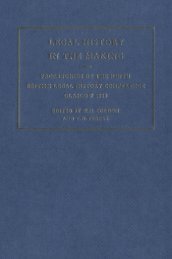130. - Collection Point® | The Total Digital Asset Management System
130. - Collection Point® | The Total Digital Asset Management System
130. - Collection Point® | The Total Digital Asset Management System
You also want an ePaper? Increase the reach of your titles
YUMPU automatically turns print PDFs into web optimized ePapers that Google loves.
254 Structure and the Book ofZechariah<br />
of fortunes' theme is noticeable. 1 Nevertheless every word here is<br />
used differently in ch. 14 from ch. 2.<br />
noto. See rn above.<br />
*DJ? occurs in 2.15, 8.7 and (especially) 8.8; this is also the form in<br />
13.9. nrn D#n mRtf occurs in the other three references in ch. 8, but<br />
a similar idea is expressed in different words in 14.2, Din in'. In the<br />
instances underlined above the plural is used.<br />
*?m is used of Yahweh who 'inherits Judah', 2.16, and of the remnant<br />
of this people: 'all these things', 8.12. ehpn noiR is found in<br />
2.16; inmK in 9.16 is comparable, but no more; in 13.5 it refers to the<br />
ground. Ehpn "in, 8.3, is similar to the expression in 2.16; iBhp ]U>n,<br />
2.17, is slightly less so. Zech. 14.5 refers to the holy ones; 'Holy to<br />
Yahweh' is the inscription on the bells, and applies also to the vessels<br />
in the temple (14.20-21). 2 <strong>The</strong> use of iftn in 2.17 is completely<br />
different from all the other occurrences.<br />
TII> represents waking from sleep (4.1), 'brandishing' (9.13), blindness<br />
(]Tf\a) (12.4), as well as 'stir into action' (2.17; 13.7; niphal and<br />
qal respectively). <strong>The</strong> last two represent Yahweh's action, but the mode<br />
of expression is very different. However, despite these disappointments,<br />
there are some clear pointers.<br />
<strong>The</strong> most striking phrase of this section is '<strong>The</strong>n/and you shall know<br />
that Yahweh has sent me to you' (2.13, 15; 4.9; 6.15) together with<br />
the 'sent me' of 2.12. It is obvious that it is the final redactor of<br />
Zechariah 1-8 who is responsible for this phrase, and that he intends<br />
it to be noted. It is not only repeated four times, but the first two<br />
occurrences frame the promise that Yahweh will dwell in the midst of<br />
his people and many nations will be his people (cf. the section in<br />
Chapter 2 above on 2.10-17).<br />
JIDX is specially emphasized in 6.8 (twice) after being mentioned<br />
along with the west and the south in v. 6. <strong>The</strong> north was traditionally<br />
the place from which the enemy came, and the place of other gods. I<br />
wonder if we are meant to notice that, in 6.10, the exiles from<br />
1. This partly depends on how 14.1 is understood. Does it mean that Jerusalem<br />
will get its own plunder back? <strong>The</strong> consensus view is that Jerusalem will suffer the<br />
humiliation of seeing its enemies divide up the plunder in the city itself (Baldwin,<br />
Haggai, Zechariah, Malachi, p. 200; Mason, Haggai, Zechariah andMalachi, 1977,<br />
p. 124; Rudolph, Haggai, p. 234).<br />
2. <strong>The</strong> Meyers' (Haggai, Zechariah, p. liii) put 'holy mountain' as a correspondence<br />
between 2.17 and 8.3, but this is not strictly true.






